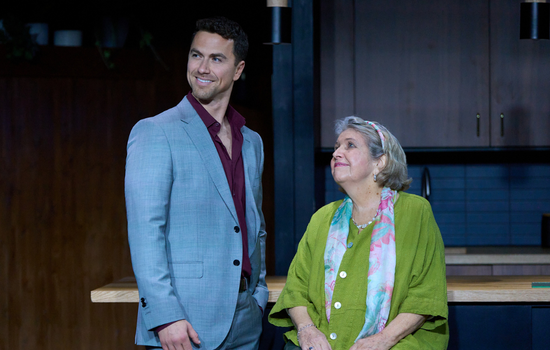Menier Chocolate Factory – until 6 May 2023
Reviewed by Claire Roderick
3***
A stellar cast elevates Jordan Harrison’s thoughtful play about memory and truth in Dominic Dromgoole’s slick production.
In the near future (85 year old Marjorie (Anne Reid) was born in 1977, making her cultural references comedy gold), a company called Senior Serenity provides a care package for the elderly and bereaved with a technological twist. The company provide an AI – a Prime – that can resemble any person at any stage of their life and be programmed with memories to provide companionship and solace to the customer.
Marjorie’s memory is failing, and her physical and mental deterioration has ended her independence, so the presence of Walter Prime (Richard Fleeshman) is a comfort. She has chosen a simulacrum of her late husband in his thirties – the reasons for this become more obvious and emotional as the play progresses). Marjorie knows that the Prime is not her husband, but the memories he can share with her, and the little tweaks she can request to make the stories more palatable/cinematic bring her happiness. Marjorie’s daughter Tess (Nancy Carroll) is suspicious of the use of Primes, but her husband Jon (Tony Jayawardena) feeds memories to Walter and acts as peacemaker between the two women.
The fractured relationship between Tess and Marjorie drives the narrative, as the death of Marjorie’s son and her refusal to speak of it has led to decades of lost trust and anger. Seeing Marjorie relating easily to an AI is almost the final straw for Tess, and the pain, frustration and sense of betrayal is palpable in Nancy Carroll’s brilliantly brittle portrayal. Anne Reid gives a masterclass in acting, effortlessly capturing the confusion and fear of dementia and the warmth of shared nostalgia before flashing sparks of the sharper woman that Tess remembers. Tony Jayawardena excels as the beating heart of the family, overflowing with warmth and desperation to help. Richard Fleeshman is eerily calm as Walter Prime, with the carefully studied movements and intonation of an emotionless mimic. The positioning of the Primes at the side of the stage, unmoving but perhaps still monitoring adds to the sense of uneasiness.
The passage of time means more of the family need Primes, and Anne Reid as Marjorie Prime has the air of a therapist as Tess can finally talk to her mother and feel heard. Jon’s heart-breaking realisation that his Prime is just a mirror and he is talking to himself throws up lots of ideas about unhealthy crutches and our need to share outweighing our need for the truth. Instead, the three Primes have a stilted conversation sharing the family’s preferred versions of memories, with serenely blank pauses. Their shared memories paint a rosier picture of the family than reality, raising more questions about truth in the digital age, but Jon’s epiphany would be more of a gut punch ending.
Marjorie Prime is a gentle, melancholy musing rather than a robust challenge of the possibilities and consequences of technology and ideas surrounding the soul and identity – but the incredible cast and performances are unmissable.

